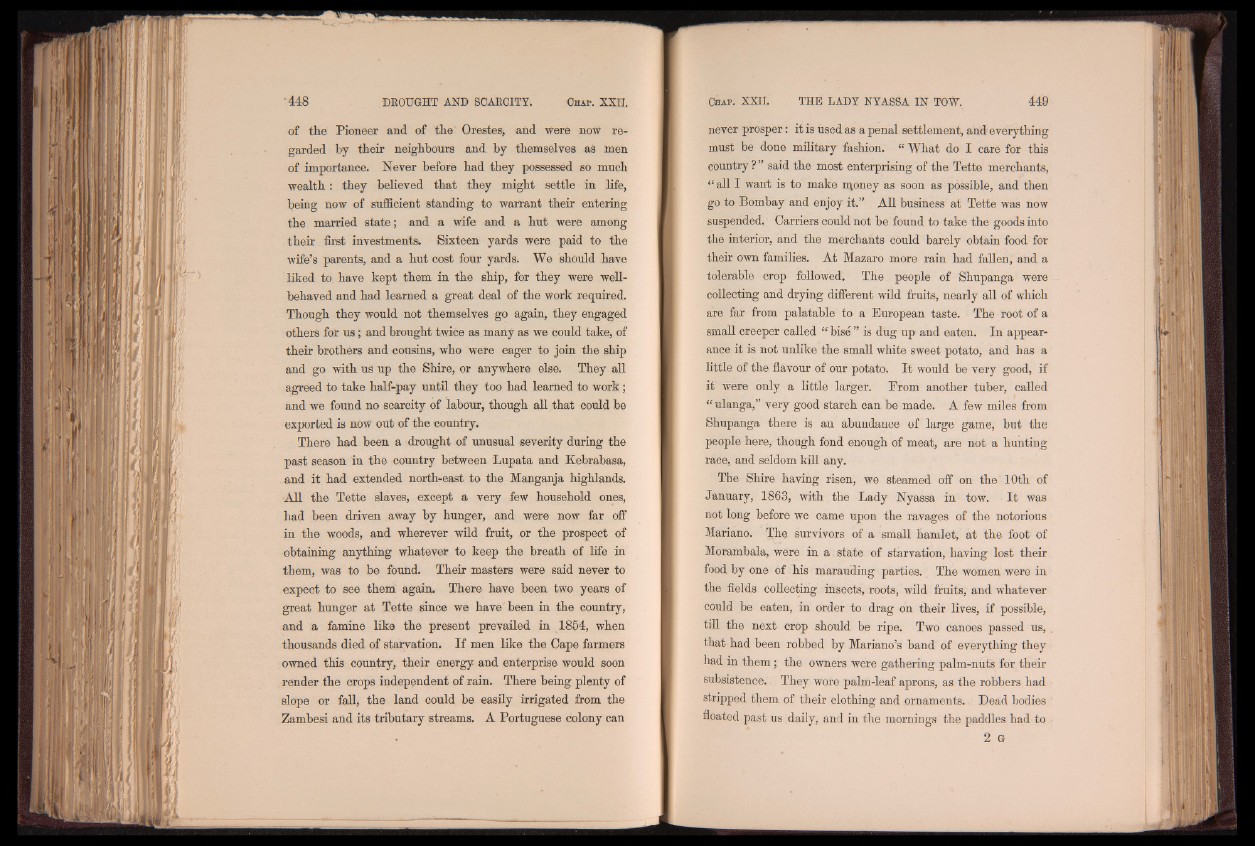
of the Pioneer and of the Orestes, and were now regarded
by their neighbours and by themselves as men
of importance. Never before had they possessed so much
wealth: they believed that they might settle in life,
being now of sufficient standing to warrant their entering
the married state; and a wife and a hut were among
their first investments. Sixteen yards were paid to the
wife’s parents, and a hut cost four yards. We should have
liked to have kept them in the ship, for they were well-
behaved and had learned a great deal of the work required.
Though they would not themselves go again, they engaged
others for u s; and brought twice as many as we could take, of
their brothers and cousins, who were eager to join the ship
and go with us up the Shire, or anywhere else. They all
agreed to take half-pay until they too had learned to work;
and we found no scarcity of labour, though all that could be
exported is now out of the country.
There had been a drought of unusual severity during the
past season in the country between Lupata and Kebrabasa,
and it had extended north-east to the Manganja highlands.
All the Tette slaves, except a very few household ones,
had been driven away by hunger, and were now far off
in the woods, and wherever wild fruit, or the prospect of
obtaining anything whatever to keep the breath of life in
them, was to be found. Their masters were said never to
expect to see them again. There have been two years of
great hunger at Tette since we have been in the country,
and a famine like the present prevailed in 1854, when
thousands died of starvation. If men like the Cape farmers
owned this country, their energy and enterprise would soon
render the crops independent of rain. There being plenty of
slope or fall, the land could be easily irrigated from the
Zambesi and its tributary streams. A Portuguese colony can
never prosper: it is used as a penal settlement, and everything
must be done military fashion. “ What do I care for this
country?” said the most enterprising of the Tette merchants,
j‘ all I want is to make iqoney as soon as possible, and then
go to Bombay and enjoy it.” All business at Tette was now
suspended. Carriers could not be found to take the goods into
the interior, and the merchants could barely obtain food for
their own families. At Mazaro more rain had fallen, and a
tolerable crop followed. The people of Shupanga were
collecting and drying different wild fruits, nearly all of which
are far from palatable to a European taste. The root of a
small creeper called “ bise ” is dug up and eaten. In appearance
it is not unlike the small white sweet potato, and has a
little of the flavour of our potato. I t would be very good, if
it were only a little larger. From another tuber, called
“ ulanga,” very good starch can be made. A few miles from
Shupanga there is an abundance of large game, but the
people here, though fond enough of meat, are not a hunting
race, and seldom kill any.
The Shire having risen, we steamed off on the 10th of
January, 1863, with the Lady Nyassa in tow. I t was
not long before we came upon the ravages of the notorious
Mariano. The survivors of a small hamlet, at the foot of
Morambala, were in a state of starvation, having lost their
food by one of his marauding parties. The women were in
the fields collecting insects, roots, wild fruits, and whatever
could be eaten, in order to drag on their lives, if possible,
till the next crop should be ripe. Two canoes passed us,
that had been robbed by Mariano’s band of everything they
had in them; the owners were gathering palm-nuts for their
subsistence. They wore palm-leaf aprons, as the robbers had
stripped them of their clothing and ornaments. Dead bodies
floated past us daily, and in the mornings the paddles had to
2 G